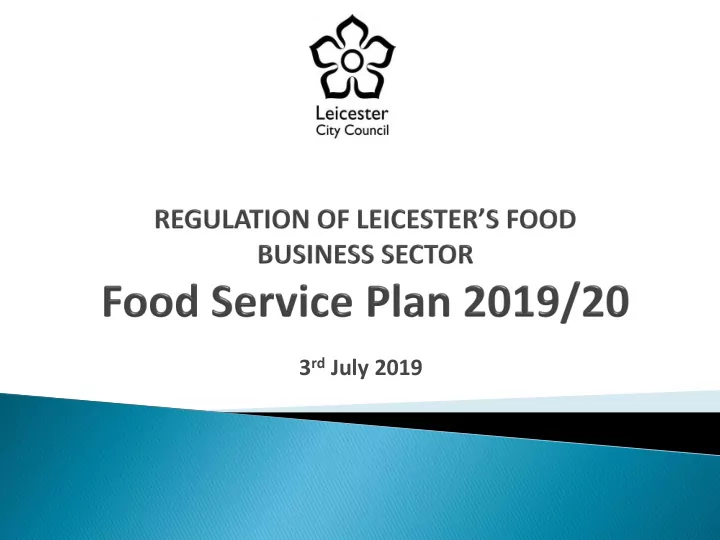

3 rd July 2019
Brief the Scrutiny Committee on the work of the Food Safety Team. Brief the Scrutiny Committee on the proposed Food Safety Team Service Plan 2019/20 Inform the Scrutiny Committee of Future Themes and Challenges to food hygiene and standards.
Establishment Type 2015 2016 2017 2018 2019 Primary producers 0 0 0 0 1 manufacturers & distributers 73 81 90 93 100 importers/exporters 6 6 9 7 17 distributors/transporters 77 82 87 94 95 retailers 730 773 782 795 821 restaurants & caterers 1942 2000 2028 1991 2079 totals 2828 2942 2996 2980 3113 • 3113 Food Establishments in total • Growth overall • Significant turn over approx. 550 new registrations a year. • Approx 50% subject to inspection in any given year
c. 3,100 registered food businesses and of these ◦ Significant diversity in the range of food businesses ◦ Significant number of NEW entrants into the Food Sector ◦ English is often not first or main language of communication ◦ A reputation for producing culturally specific foods, e.g. Paneer, Polish dumplings, Asian sweets Key features of the Food Sector are: ◦ Increase forecast in line with Leicester City Economic Strategy and LLEP ◦ 25% Increase in food manufacturers since 2013 ◦ Highly competitive market/low profit margins ◦ High turnover in ‘restaurants and catering’ sub -sector. ◦ 13.5% increase in compliant food businesses since 2014
Leicester City Council as a Food Authority has a Statutory Duty. Our aims are: ◦ Prevent ill-health and potential death. ◦ Ensure the supply of good quality, safe food. ◦ Prevent and detect food fraud ◦ Assist Leicester’s food businesses to comply with food law. In order to protect: ◦ Public Health ◦ Consumers Purse and Choice ◦ Good Businesses from Unfair/Unlawful competition ◦ Our country’s export markets
As a Unitary Authority the FST Regulates both Food Hygiene and Food Standards Hygiene – safe handling and preparation of food Standards – labelling, claims, misleading Advice and support for new businesses Risk Based Inspection Plan – 5 categories of inspection A to E. Graduated enforcement.
• Food Safety Team Management • 1.5 FTE • Oversight of inspection program, monitoring of standards, supervision of officers, support/review of enforcement actions • Food Safety Team • 11 Officers (10.6 FTE) • Close working relationship with Internal services • Trading Standards • City Wardens • Licensing • Public Safety Team • Liaison with national and regional organisations • Leicestershire Food Group • Food Standards Agency • Trading Standards East Midlands • Public Health England • National Food Crime Unit
Notable Incidents and events ◦ Withdrawal of Approval status from a Meat Products Manufacturer ◦ Primary Authority Arrangement between LCC and Navitas/ESB Ltd confirmed – the first for LCC. ◦ Prosecution of FBO of Big Wang Welford Road. Guilty to 11 charges £6306.40. ◦ Food incident – Joint exercise with NFCU on illegal Chinese imports ◦ Promotion of 5 Rated Establishments ◦ Dave Howard voted in as Vice Chair of the National Food Hygiene Focus Group FST Performance ◦ 1675 (1663) Food hygiene inspections ◦ 87 overdue inspections (carried forward to 2019/20) ◦ 1571 (1290) Compliance checks ◦ Since 2014 we have seen a 13.5% rise in the level of broadly compliant food establishments (71.5% to 85%).
Regulating Our Future FSA strategic review of food law enforcement – ongoing. Key areas Centralised Online Registration Intervention based on risk assessment by segmentation Nationally set bespoke inspection programmes for big businesses FSA review of Food Standards Food law and enforcement has become more complex – eg allergen control crosses Food hygiene and Food standards requirements EU exit Particular challenges for import and export of food. Movement/employment of food handlers Sharing of intelligence information Management of cross border incidents
Completion of Planned Interventions – 1749 inspections due Advice and Support – Sustainable food businesses Targeted Graduated Enforcement Preparing for the future (ROF and BREXIT) ◦ Keeping our food businesses are informed ◦ Ensuring senior management is informed ◦ Liaison with other internal and external regulators ◦ Adapting internal arrangements in anticipation of changed regulatory regime ◦ Associated officer training to ensure effective implementation of any changes. Engage with The Food Plan and Public Health Agenda
THANK YOU FOR LISTENING QUESTIONS?
Recommend
More recommend